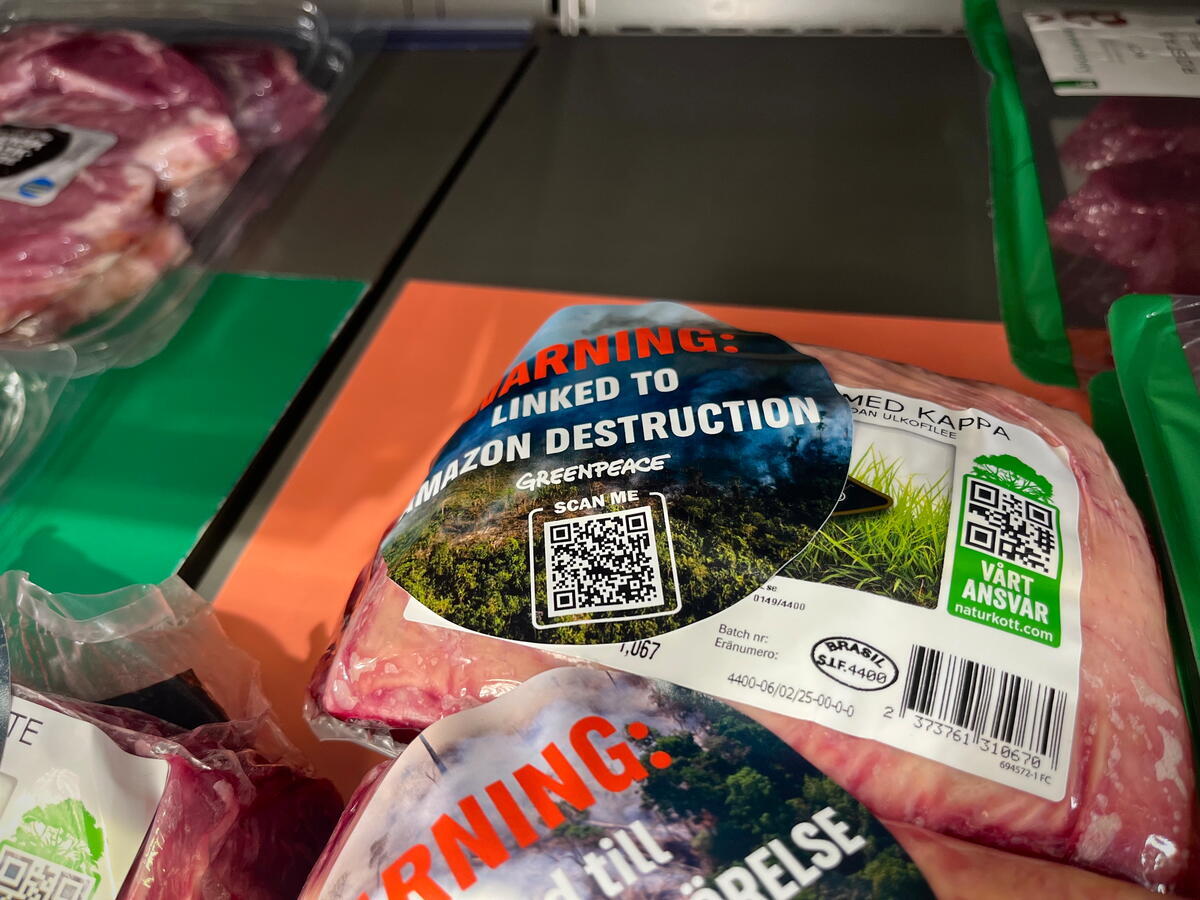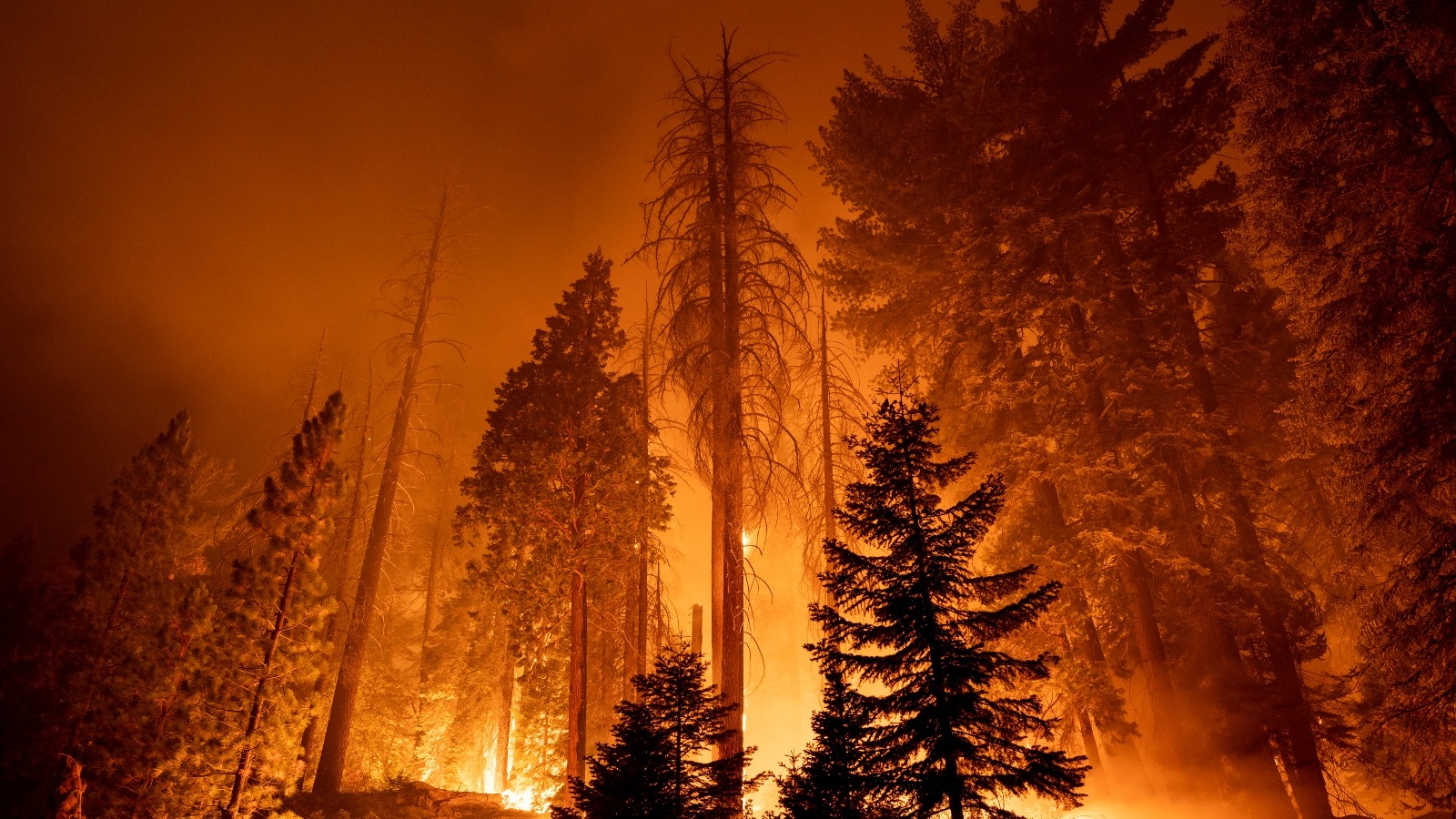I’m a campaigner with Greenpeace Nordic, working right now from the Brazilian city of Belem, at the mouth of the Amazon river. If, like me, you were waiting outside the COP30 climate talks this week, you might have seen someone holding a sign exposing what is really happening inside. The reality? Industrial agriculture is out in full force.
From JBS, the world’s largest meat company, to pesticide giants like Bayer, global agribusiness is at COP30 to make you forget that food systems contribute around a third of global greenhouse gas emissions, and instead, convince you that it actually is a solution to global heating.
© Ludvig Tillman / Greenpeace
COP30 should be a defining moment for the climate. With political leaders gathered in the Amazon, there is a real opportunity to close the 1.5°C ambition gap, have robust decisions towards ending deforestation, hold big polluters accountable and avert the worst impacts of climate change.
That’s why we’re urging governments to see through the corporate smokescreens, deliver a Forest Action Plan, and channel funding to Indigenous and local communities, the real climate leaders already protecting forests and biodiversity – add your name here to demand global leaders Respect the Amazon.
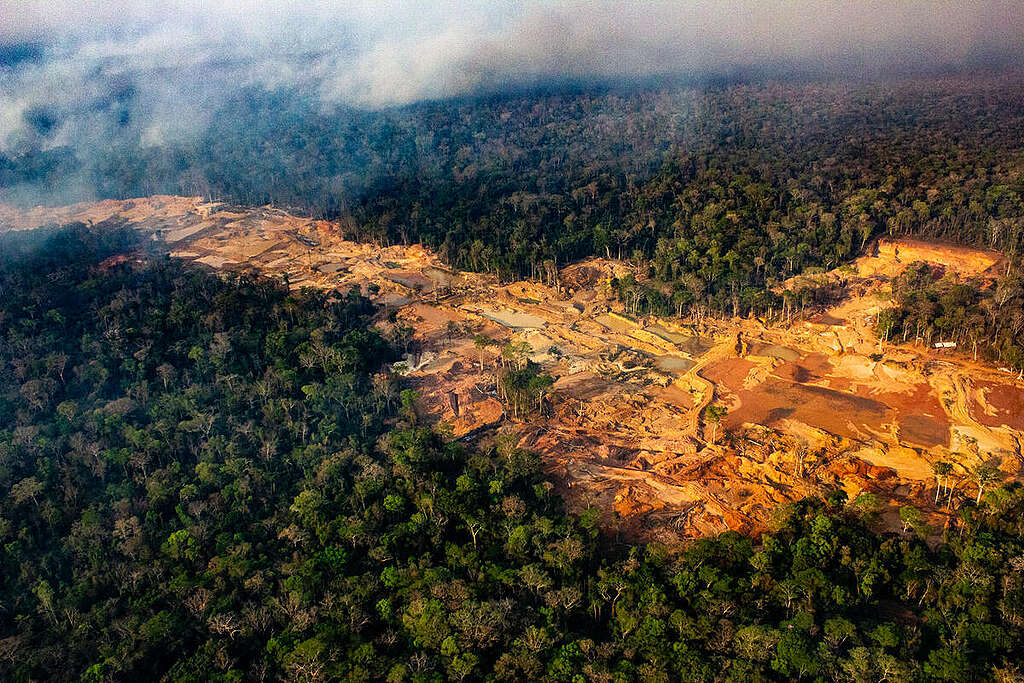
Respect the Amazon
Ask political leaders to act on their promises to stop Amazon destruction.
But from glitzy receptions to side events, press conferences and sponsored pavilions, Big Ag is everywhere you look at COP30, with a very different agenda. Over 300 corporate lobbyists are throwing around buzzwords like ‘climate-smart agriculture’ and ‘no additional warming’ to divert attention away from the rampant deforestation, spiralling emissions and unchecked pollution upon which the industry is based.
JBS’s COP30 showcase: Greenwash and the false promise of “climate leadership” from Big Ag
Few companies epitomise Big Ag’s efforts to gloss over its abysmal environmental record than Brazilian beef behemoth JBS.
JBS has been repeatedly linked to deforestation, corruption scandals and indigenous land rights violations, including as recently as this year. According to a recent report by Greenpeace Nordic, IATP, Foodrise and Friends of the Earth, JBS is estimated to be by far the largest greenhouse gas emitter amongst 45 major meat and dairy companies examined. And emissions from this sector contribute the bulk of the whole agricultural sector’s total emissions.
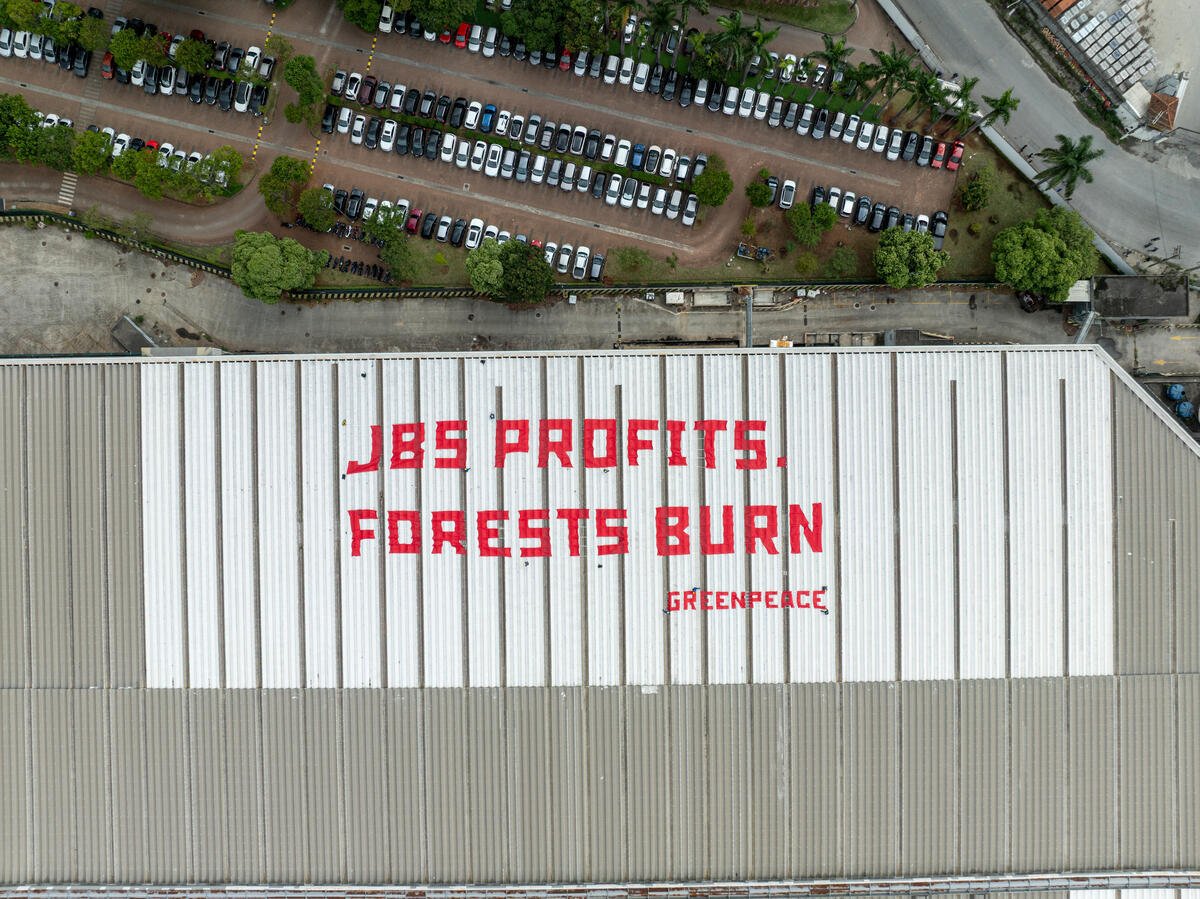
© Greenpeace
Despite this, JBS has long sought to cast itself as a climate leader, with admittedly limited success. In fact, just days before COP30 began it settled a lawsuit with the New York Office of the Attorney General for USD1.1 million over alleged greenwashing. Now it is facing a fresh legal challenge from NGO Mighty Earth over its net-zero claims.
This track record might make JBS an unlikely candidate to spearhead the meat industry’s greenwashing efforts, but JBS is steaming ahead. In corporate presentations and events at COP30, it has tried to convince the world that livestock farming can be a solution to, instead a driver of the climate crisis.
According to Bloomberg, JBS’s poster child for this supposed breakthrough is Fazenda Roncador, one of Brazil’s largest cattle and crop farms. In the run-up to COP30 JBS touted Roncador for introducing practices which the farm claims to have enabled them to achieve a “carbon-negative” balance since 2014.
They argue greenhouse gas emissions from livestock production have been calculated all wrong and that regenerative livestock farming in tropical climates (“tropical agriculture”) means farms can capture more carbon than they emit. In short – crop and livestock integration results in soils taking up more carbon than the cows kept on the same farm emit as methane – a super-potent gas that scientists estimate has driven at least a third of warming in recent years.
It’s not just JBS jumping on this snazzy new concept. Several other agribusiness giants are throwing their weight behind this narrative at COP 30. Even Brazil’s “special envoy for agriculture,” Roberto Rodrigues, is telling COP attendees that his country can take the lead in “low-carbon tropical agriculture.”
Behind the greenwashing curtain
However, as is so often the case with Big Ag, all is not what it seems. Both Brazil’s research institute Embrapa and Kansas State University were contracted to validate Roncador’s ‘carbon-negative’ claims. To the best of our knowledge, neither has published comprehensive details on their results or the methodology used. A lack of transparency like that should raise red flags for policymakers and investors alike.
Furthermore, there is always a limit to how much carbon grassland soil can hold. Once the soil reaches equilibrium with the ecosystem it stops absorbing carbon — but cows grazing on that land don’t stop emitting methane! So while “regenerative agriculture” can have positive effects on nature and biodiversity, it is no magic wand for the climate. Scientists warn that additional storage of carbon in soil simply cannot offset the huge climate impact from ongoing livestock emissions, particularly methane.
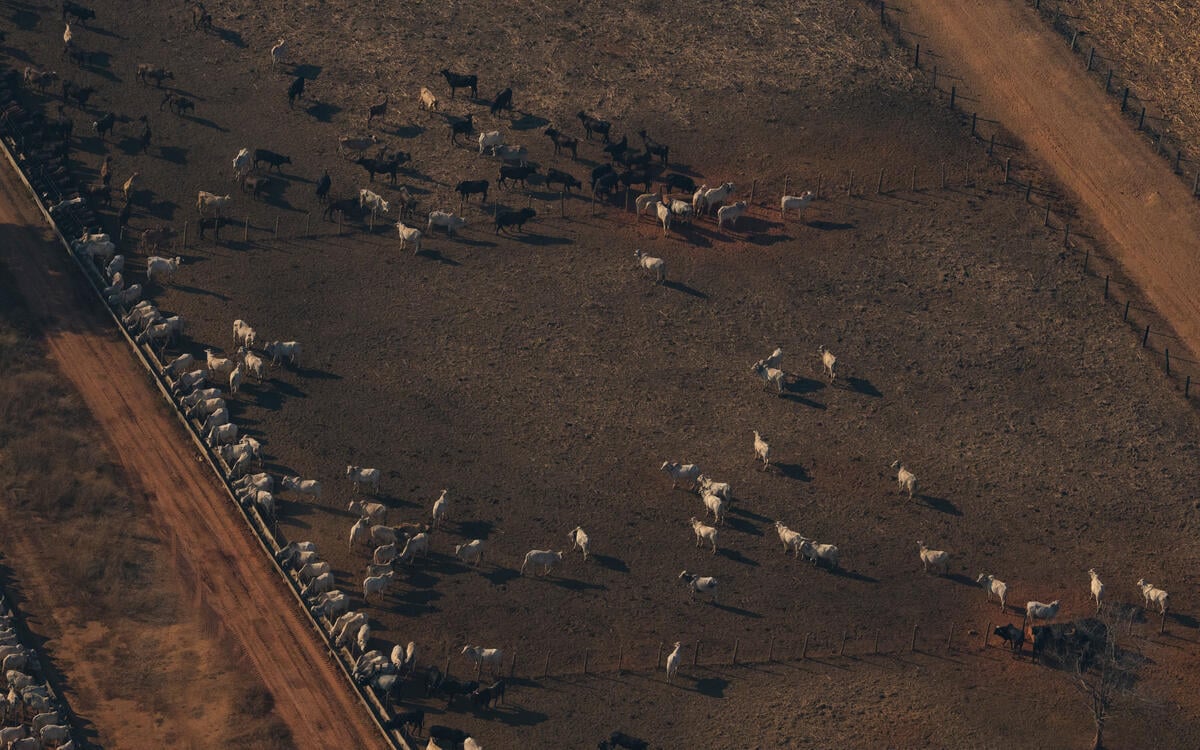
© Samara Souza / Greenpeace
Whatismore, major actors in the sector, including Roncador, aim to profit from selling carbon credits based on these uncertain figures, while, at best, farms like Roncador just repay the soil carbon debt caused by years of mis-management leaving pastures degraded. And, when rainforest is chopped down to make way for pasture (as 90% of deforested areas in the Brazilian Amazon reportedly are), it leaves a colossal carbon and biodiversity debt that no amount of soil sequestration can even begin to repay.
Better agriculture practices in some farms alone is not enough – it must be supported to become the norm across all of Brazil and, crucially, combined with the full elimination of deforestation from supply chains, alongside binding targets to reduce agricultural emissions, and a transition to agroecology.
Beyond Big Ag
The above example is just a snapshot into Big Ag’s lobbying efforts at COP. Hang around COP’s dedicated ‘Agrizone’ and you will hear lobbyists singing the virtues of the industry’s favourite fixes, from carbon offsets to ‘tropical agriculture’.
You might hear new – and deeply concerning – efforts to reclassify methane emissions under the banner of ‘no additional warming’, allowing major livestock producers to continue producing dangerously high levels of methane.
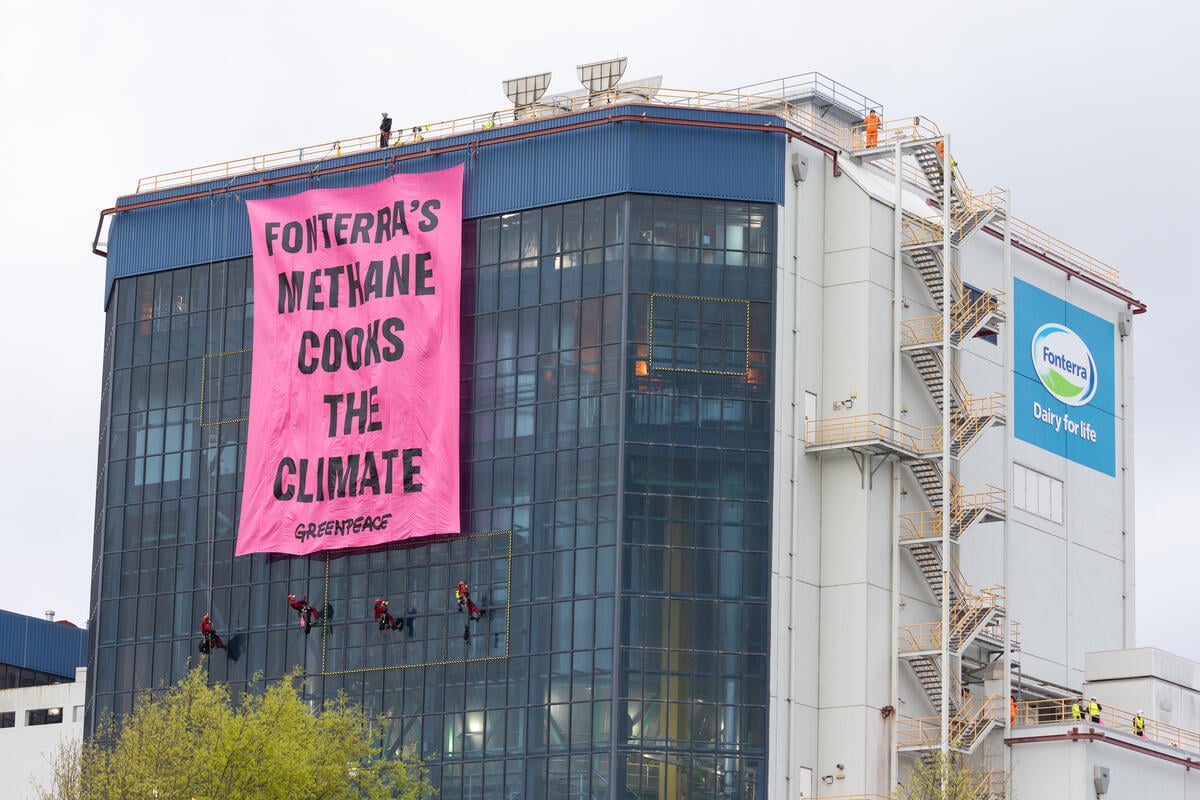
© Bryce Groves / Greenpeace
But scratch the surface and you will quickly find the ugly reality concealed beneath: our current food system is not designed to ‘feed the world’ but is instead supercharging climate change and destroying ecosystems like the Amazon.
That’s why at COP30, it’s so urgent that governments see through Big Ag’s greenwash. We urgently need effective action that not just halts, but reverses deforestation. Only then can we really start repairing the damage that Big Ag has wrought on the world’s greatest rainforest and avoid irreversible tipping points.
Add your name to the Respect the Amazon petition and demand that leaders at COP30 deliver a strong Forest Action Plan to implement the goal of halting and reversing deforestation and forest degradation and work to keep the 1.5°C goal within reach.
Jehki Härkönen is a campaigner at Greenpeace Nordic.

Respect the Amazon
Ask political leaders to act on their promises to stop Amazon destruction.
Source link
Jehki Härkönen www.greenpeace.org

